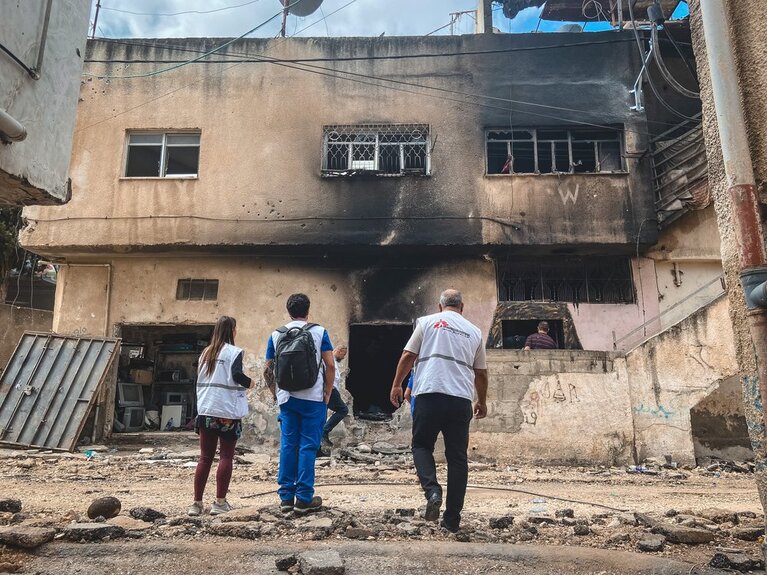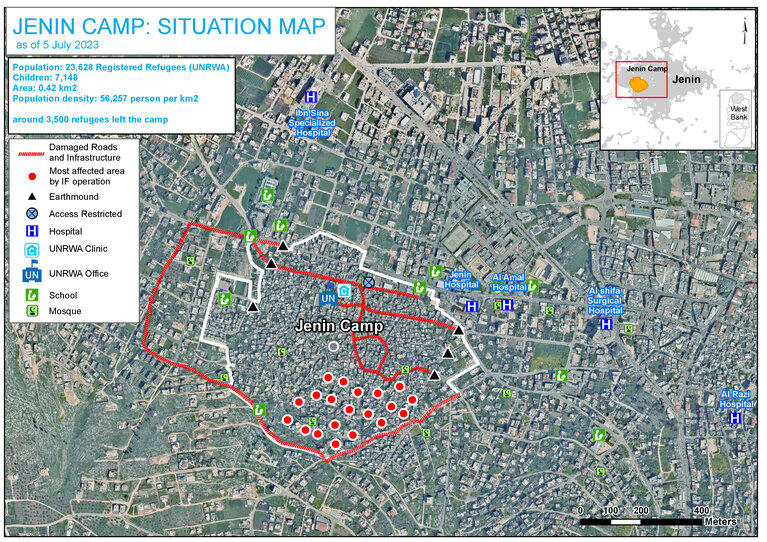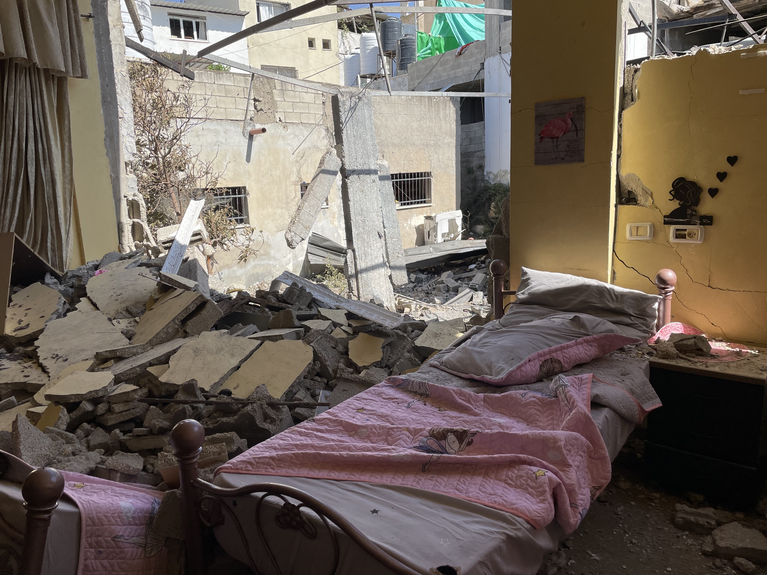Israeli forces’ operation in Jenin | Situation Report #1 as of 17:00, 6 July 2023
SITUATION OVERVIEW
Overnight between 4 and 5 July, Israeli forces withdrew from Jenin city and the Jenin Refugee Camp. This concluded a large-scale operation that spanned 3 and 4 July, involving both air and ground forces in the camp and its surroundings. It began in the early hours of 3 July with a series of Israeli airstrikes, likely conducted by drones, followed by a large number of ground troops entering the area and engaging in exchanges of fire. This is the second operation in the Jenin Refugee Camp involving air strikes within two weeks this year.
The two-day operation resulted in casualties, internal displacement, and damage to buildings and infrastructure. According to the Palestinian Ministry of Health (MoH), twelve Palestinians, including four children, were killed in Jenin during the operation. Furthermore, MoH reports that 143 Palestinians were injured, and that 20 of them are in critical condition. One Israeli soldier was killed, according to official Israeli sources.
The Israeli operation resulted in the highest number of Palestinian fatalities in a single operation in the West Bank since OCHA started recording casualties in 2005.
Initial estimates from local authorities indicate that hundreds of housing units in Jenin Refugee Camp sustained damage, including some rendered uninhabitable. Over 500 Palestinian families, comprising more than 3,500 people, were internally displaced during the operation. These families were forced to leave their homes either due to damage or destruction, or due to safety concerns. Most of the internally displaced persons (IDPs) sought refuge with relatives or neighbouring families, while others found shelter in the government hospital and other government buildings, such as the city's youth centre. While many of the IDPs have been able to return, according to initial assessments, about 20 families are still displaced.
The Israeli operation caused significant damage to electricity, water, and sewage networks in Jenin Refugee Camp and its surrounding neighbourhoods. The Jenin municipality reports that about 8 kilometres of water pipelines were destroyed, resulting in a complete cut-off of water supply to the camp since the afternoon of 3 July. The municipality is working to restore water services. It is estimated that it could take more than ten days to complete these efforts. Furthermore, about 300 households had their water tanks damaged or destroyed during the operation, resulting in reduced or no domestic water storage capacity. While the main sewage pipeline is operational and provides services to most of the camp, an estimated two kilometres of the pipeline has been severely damaged. It is estimated that about 100 households lost their sewage connection. Repairs of the electricity infrastructure are underway.
During the two-day operation, movement and access to the refugee camp was restricted by Israeli forces and often unsafe. Vehicular and pedestrian entry to the camp was predominantly limited to one entrance, where Israeli forces conducted vehicle inspections, including on ambulances. Furthermore, Israeli forces bulldozed about 3.9 kilometres of roads in and around the refugee camp. These actions severely hindered the ability of ambulances to reach and provide assistance to those injured within the camp.
Furthermore, several teargas canisters and sound grenades fired by Israeli forces landed within the premises of health facilities in Jenin city and gunfire was reported inside the Jenin government hospital. Additionally, UNRWA’s only health clinic in the camp sustained extensive damage.
On 4 July, international humanitarian actors carried out an inter-agency field mission to Jenin city, as the operation was still ongoing. They visited the Jenin Municipality and the Jenin Governmental Hospital and delivered essential medical supplies. On 5 July, once the access to the camp was restored, humanitarian teams started a rapid multi-sectoral assessment. Together with the local authorities, they began delivering essential assistance, including water. In the coming days, the priority will be to increase the response to the needs of those affected.
BACKGROUND
In Jenin governorate, the number of Palestinian fatalities so far this year (63) has more than doubled compared with the same period last year (26). Among this year’s fatalities in Jenin, 57 were killed during search-and-arrest operations and other operations carried out by Israeli forces, three during punitive demolitions, and three during Palestinian attacks against Israeli forces.
Additionally, since the beginning of 2023, at least 377 Palestinians have been injured by Israeli forces in Jenin governorate.
HUMANITARIAN RESPONSE AND ONGOING NEEDS
The below sections divided by cluster provide a snapshot of the needs identified during initial interagency assessments that began during the operation and continued on the 5 and 6 July. Immediate responses have already been launched and additional responses are planned. Where possible, indications of additional funding requirements have been included by clusters, but these do not include the funds required by UNRWA.
Protection
Priority needs
- Children showed signs of severe psychological distress, especially those who witnessed the operation directly.
- The presence of explosive ordnances are visible within the refugee camp and the risks need to be assessed and information shared with the community.
Responses implemented
- Protection Cluster members are conducting initial monitoring and documentation of potential violations of international law.
- Legal partners are helping families trace missing members by submitting requests to the Israeli military for information on detainees’ whereabouts.
- Child protection and MHPSS partners are providing support to children and caregivers in Jenin, including psychological first aid for 70 displaced persons, either in person or remotely.
- Response to gender-based violence (GBV) resumed in the camp on 5 July.
Response planned
- MHPSS will include individual assessments, psycho-social support (PSS), and referral of severely affected children and families to case management services, as well as follow up on critical cases.
- Protection cluster partners are identifying and allocating funding to purchase a bulk of dignity kits to be delivered in the camp.
- UNRWA has started assessing of the protection needs of families and will refer cases to specialized MHPSS and child protection partners as needed.
- UNMAS is coordinating with the Palestinian Mine Action Center (PMAC) to lead a formal risk assessment of Jenin.
- Protection cluster partners will provide explosive ordnance risk education (EORE) training in schools and raise awareness of associated risks, particularly among children potentially exposed to unexploded ordnances (UXOs).
Key constraints/gaps
- Stocks of dignity kits are currently depleted in the West Bank. Other reproductive health items required include baby formula and diapers.
- There are gaps in specialized mental health support for those facing acute distress or who have several mental health conditions, requiring focused and specialised mental health and psycho-social support (MHPSS).
Funding
- Partners providing MHPSS and child protection interventions are reallocating funds from ongoing projects to respond to the immediate situation and needs. Medium-term financial needs are to be assessed to determine whether new funds are required.
Health
Priority needs
- UNRWA’s primary health care centre in the refugee camp needs to be repaired due to significant damages. The agency is providing some services from a temporary facility. It is estimated that repair may take at least 8 weeks.
- Supplies that were depleted during the operation need to be pre-positioned, both at the facility and the community levels.
- The trauma system needs to be further strengthened in light of issues identified during the operation.
- The injured require rehabilitation support.
- MHPSS is needed for the residents of the camp and the city.
Responses implemented
- Health cluster partners successfully delivered two pallets of emergency medical supplies as part of the UN mission visit to Jenin. The shipment included 26 cartons, containing six types of supplies that address the needs of about 300 trauma casualties.
- Some partners have been working side-by-side with healthcare workers in the hospitals managing the injured.
- MHPSS was provided through a telephone counselling hotline.
Response planned
- Pre-positioned supplies will be replenished at the facility and community levels.
- Emergency supplies will be procured for health facilities.
- Healthcare workers and community volunteers will continue to receive capacity building, in particular on mass casualty management.
- Support will be provided to operationalise the MoH Public Health Emergency Operation Centre.
- A collective Risk Communication and Community Engagement (RCCE) campaign will be carried out to raise awareness on the importance of not gathering in hospitals Emergency Department during crisis.
- Patient referral mechanisms will be strengthened.
Key constraints/gaps
- Emergency response coordination capacity of the MoH requires support.
- Health staff shortages undermine response capacity during a crisis.
- No psychosocial workers at Emergency Department level.
- Some logistical issues, such as medical waste management, need to be addressed.
Funding
- The Health Cluster estimates about US$1.5 million is needed to support:
- Replenishment and pre-positioning supplies at facility and community levels.
- Capacity building of health workers and community volunteers.
- Rehabilitation of the injured.
- Provision of MHPSS.
- RCCE campaign on the dangers of crowds entering the hospital during crisis.
Water, Sanitation and Hygiene (WASH)
Priority needs
- The refugee camp currently lacks access to water supply, with the main transmission pipelines extending 2.5 km to the camp impacted by the IF operation. Additionally, the water distribution network and household connections, spanning about 5.5 km, were also affected.
- In terms of access to sanitation, initial estimates indicate that about 2 kilometres of the internal sewer collection network and about 100 household sewer connections have been affected.
- The exchange of fire in the area has resulted in various levels of damage to about 200-300 roof water tanks, ranging from partial to complete destruction.
- Hundreds of shelters have been significantly damaged, including their essential WASH facilities.
Responses implemented
- The Jenin Municipality has taken the lead in the emergency provision of water to the residents of Jenin Refugee Camp.
Response Planned
- The Jenin Municipality is assessing their capacities and the available tools and materials to respond to the water supply damages. The municipality will try to fix the main transmission pipeline to restore the bulk water supply to the camp.
- For the other main pipelines and distribution network, the Jenin Municipality will work on them in the coming days.
Key constraints/gaps to the response
- The extensive damage of the camp streets has posed significant challenges for the Jenin Municipality and WASH partners to accurately assess WASH infrastructure needs.
Funding
- The WASH Cluster estimates the immediate funding required to cover the most critical WASH needs is $400,000.
Shelter
Priority needs
- Initial assessments indicate that about 800 housing units in the Jenin Refugee Camp could have sustained damage. The assessment process is still ongoing.
- Based on UNRWA’s findings as 15:00 on 6 July, which covers only some of the affected structures, 21 housing units are classified as uninhabitable (14 units completely burned, 5 unites destroyed, and 2 units severely damaged), while 40 units sustained significant damage but are still liveable (damage to doors, windows and non-structural walls). This number is expected to increase as the assessment continues
- Based on UNRWA findings, about 20 families are still displaced. Assessments are still ongoing.
Responses implemented
- UNRWA assessment teams have visited 60 households in four areas of the camp.
- Additional resources have been allocated to expedite the assessment process and support UNRWA teams.
Planned response
- UNRWA will offer one-time rental subsidies to displaced families and provide assistance for lost personal belongings.
- Several other partners have expressed their willingness to provide multi-purpose cash assistance (MPCA) to displaced families, but the initial damage assessment still needs to be completed
Key constraints/gaps
- Due to the significant amount of damaged infrastructure, the assessment of the damage is still in progress. It is still not possible to estimate funding requirements.
Food Security
Priority needs
- Various goods, particularly children’s supplies, are needed in the shops of the refugee camp.
- Wheat flour, pulses, vegetables, dairy products, bread, and eggs are the main food products which decreased in inventories.
- All bakeries inside the Jenin Refugee Camp are closed. Three bakeries were destroyed.
- There is a high demand for canned food, leading to a slight deficit in food stock. However, goods are expected to arrive in Jenin shortly through support channels and from traders.
- Lack of electricity undermines food refrigeration in shops and homes. An increase in food waste is expected.
- According to a rapid survey carried out between 3 and 4 July, assessing food availability and accessibility in local shops. The three shops that accept e-vouchers located in Jenin city have been shut down for two days.
- Many people in Jenin Refugee Camp are expected to face a shortage of essential goods necessary for sustaining their livelihoods, which may undermine their food security and exacerbate overall poverty needs.
Responses already implemented
- WFP has conducted a rapid survey assessing the food availability and accessibility in nine local shops.
Responses underway and planned
- Reinforcing and expanding assistance programmes supporting vulnerable and affected populations for general voucher or cash assistance to cover basic needs.
- Providing affected households, particularly those who lost their homes, with short-term emergency food vouchers for three months.
- Prioritizing livelihood activities for those affected for 6-12 months.
- During the coming days, UNRWA and the Ministry of Social Development teams will create a list of affected families; a sample of them will serve as a basis for a deeper food security analysis.
- Monitoring the socio-economic and market situation for the coming six months.
Key constraints/gaps
- Camp residents cannot easily access basic supplies, including food, water and medicines, because of the destruction to infrastructure and buildings.
Funding
- The Food Security Sector is underfunded and estimates financial difficulties in providing the required support in response to the increased needs
Education
Priority needs
- Four UNRWA school buildings sustained minor damages.
- Roads to and from schools are severely damaged, which could result in difficulties for children to reach their schools.
- MHPSS needs for children, school staff and children are very high.
- The opening of the roads that lead to the schools is needed.
Response planned
- Back-to-school kits (stationary), school bags, hygiene kits, uniforms for about 300 students.
- MHPSS for 1,690 students (850 boys and 840 girls), including community-based interventions and support to families.
- Safety and security sensitization on UXOs for school children.
- Rehabilitation of minor damages for four UNRWA schools (windows, doors, water tanks, solar panels).
Funding
- While some of the interventions will utilize pre-positioned supplies and reprogramming of funds, the Education Cluster estimates that at least an additional $200,000 is needed to respond to the priority needs in the coming four to six weeks.
The Cash Working Group is planning to provide emergency MPCA to all affected households and, at a second stage, MPCA to those who had their livelihoods affected.
Prevention from Sexual Exploitation and Abuse (PSEA)
The PSEA Network is identifying, in coordination with the clusters, key service delivery points that will be monitored on a rotational basis by a team of volunteers promoting safeguarding messages and access to the Sawa Helpline for MHPSS and the reporting of any wrongdoing. The PSEA Network has initiated a media campaign of 100,000 SMS Messages and radio spots in two main stations in Jenin with safeguarding messages. Two MHPSS teams will be deployed in the area under the coordination of the Protection Cluster.
Awareness materials, solar power banks and dignity kits are needed for those that the network reaches.
The helpline monitors calls on a daily basis, and an increase has been noticed. All partners have been provided with clear instructions to introduce PSEA in ongoing assessments.












